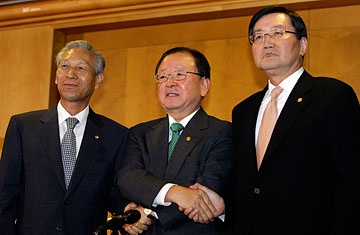
South Korean Minister of Strategy and Finance Kang Man-soo, center, Chairman of the Financial Services Commission Jun Kwang-woo, right, and Bank of Korea Gov. Lee Seong-tae, left, meet the media after a joint press conference in Seoul, South Korea, Oct. 19, 2008
After initially being slow to react to the spreading fallout from the U.S. financial system meltdown, Asian policymakers in recent days have been forced to adopt a more aggressive approach to shielding their economies from further damage.
On Oct. 19, South Korea's government announced it would guarantee external borrowing by Korean banks through June up to a total of $100 billion and to inject a further $30 billion into financial markets. The steps are aimed at alleviating growing difficulties Korean banks have faced getting U.S. dollar financing from skittish international banks. Korea's move followed the lead of other Asian governments. Last week, Hong Kong, Singapore and Malaysia guaranteed all bank deposits, part of a larger effort to rebuild confidence in financial markets. A half dozen Asian central banks, including China's, have cut interest rates in recent weeks. Central banks have also taken action to boost liquidity.
These steps have been necessary despite the fact that Asia's banks have barely been dented by the toxic assets that devastated lenders in the West. But as confidence seeped from the region's financial markets, banks became nervous about parting with funds, credit tightened, and stock markets plunged. South Korea has been looking particularly vulnerable to further turmoil. With some $80 billion of its banks' foreign debt maturing by mid-2009, investors worried the country could face a credit crunch that would restrict lending throughout the economy. Those fears have punished Korean stocks and the country's currency. The won plummeted nearly 10% on Oct. 16, its biggest one-day drop since the 1997 Asian financial crisis. Standard & Poor's last week also put seven South Korean banks on negative credit watch.
Seoul's decision to guarantee external debt incurred by South Korean banks was cheered by market analysts. Goldman Sachs noted in a report that the package — which totals some 13% of Korea's GDP — will "go a long way toward stabilizing the jittery financial markets in Korea." Fitch Ratings added that "these measures will ensure sufficient U.S. dollar liquidity to the banking system and real economy." Investors responded positively, but cautiously. The benchmark Kospi stock market index rose 2.3% on Monday, while the won gained 1.4% against the dollar.
Kim Eng Tan, director of sovereign ratings at Standard & Poor's in Singapore, says that it was almost inevitable that Asian governments would have to intervene more directly to stabilize financial markets. That's because massive rescue packages engineered in the U.S. and Europe to support their financial institutions threatened to put Asian lenders at a disadvantage in global markets. "It becomes peer pressure," Tan says. "The more people do it, the more you have to do it. Otherwise, you feel confidence may be lost."
The measures appear to have helped unlock frozen credit markets. The three-month Hong Kong interbank rate, or HIBOR, a measure of the difficulties of getting access to credit, fell by more than half a percentage point Monday, the biggest drop in a decade.
Asia's recent troubles show how easily even the healthiest of banking sectors have been dragged into the international turmoil. Korea's banks have a mere $70 million of exposure to risky mortgage-linked securities, and nonperforming loans are at an all-time low. Still, Korea has been exposed to the global crisis because its banks rely on more foreign financing than others in Asia. To some, the recent upheaval in Korean markets was eerily similar to the country's financial crisis in 1997. Back then, Korean banks also had trouble refinancing borrowings from jittery foreign banks, creating a shortage of dollars that required an IMF bailout. However, Tan of Standard & Poor's says that current conditions are vastly different than those of 10 years ago. Not only are Korea's banks much stronger, but, with $240 billion in foreign currency reserves, the country's finances as a whole are in much better shape, Tan says.
There may be little hope, however, of avoiding the next stage of the global financial crisis: dramatically slower economic growth. The surprising speed at which Asia's economies are decelerating was made clear in China's third quarter GDP figures, released Monday. At 9% growth, China experienced its slowest quarter since 2003. The State Council over the weekend issued a policy statement in which the government promised to provide economic support through greater infrastructure spending, and by offering tax breaks to help small companies and the sagging property market. As the global financial crisis unfolds, the role Asian governments play in the regional economy will likely continue to grow.
